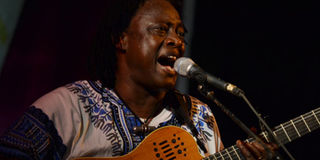Habib Koite: My music is a product of diversity

Habib Koite during his performance at the 17th edition of the Zanzibar International Film Festival 2014
What you need to know:
- Whereas his latest album ‘Afriki’ has done well so far in Europe and the United States, Koité is still grateful For his first album ‘Muso Ko’
Dar es Salaam. Kicking a rag ball on the streets of Bamako during his early childhood, Habib Koité never imagined that he would one day be traversing the world, gracing international music stages and audience.
Today he is an acclaimed musician who learnt his trade watching his parents playing the n’goni a string musical instrument which is popular in West Africa.
“My mother used to sing at village ceremonies while my father would play the guitar and sing as well; it is through them that I was inspired to become a musician,” says the 56-year-old who was born in Thiès, Senegal.
Describing his music, Koité tells The Beat that his is a diversification of Malian styles synchronized and communicated to the world.
“As you know Mandinka Empire was the heart of Mali, so I have basically tried to bring the styles and melodies together in my recordings,” says the singer who performed at the grand closure of the ZIFF.
Referring to his target audience, Koité says much as the message comes from his heart, he doesn’t have a specific audience.
“I know where it comes from, but I have no idea where it goes,” he says with a smile.
In 1986, Koité teamed up with some of his childhood friends in Bamako to form the Bamada Band. With Bamada, Koité serves as the lead vocalist and the lead guitarist, playing the popular n’goni.
Bamada is a nickname given to the residents of Mali’s capital Bamako, which roughly translates as “In the mouth of the crocodile.”
In 1991, the versatile musician recorded and released one of his best songs titled Cigarette Abana (No more cigarettes), a hit that earned him many fans. According to Koité, Cigarette Abana was a song that propelled him to stardom and he is ever grateful for it.
“The first time it went on air was in January 1993; everyone loved the song, even some weeks ago when the world marked No Tobacco Day, the song enjoyed massive airplay in Mali and activists would come to my house and interview me on the dangers of smoking…I have become more of an ambassador now,” says Habib.
As to whether the song has helped in reducing the trend of cigarette smoking in Mali, Koité says he has been told that it has somewhat succeeded in doing that, though he finds it hard to believe.
However, he says he is aware of some chronic cigarette smokers who would turn off their TVs each time the song is played.
Years later Koité recorded another song Nanalé, a title that saw him being honoured with Radio France International Discoveries Prize in 1992.
“This was a great achievement in my career, it was an exciting experience being recognised at such a massive event, in it fact gave me an impetus of recording other songs which have since become great,” he notes.
As part of the award, Koité travelled to France to undertake a music course.
The award served as a cushion into success as Koité was able to launch his first tour outside of Africa in 1994.
He met his manager the next year, and released his first album, Muso Ko which rose to number one on the European World Music Charts.While his latest album Afriki has done well so far in Europe and the United States, Koité is still grateful for his first album Muso Ko which marked his maiden entry on the entertainment scene followed by Ma Ya which saw him cross the Atlantic for a series of concerts. Koité and his band were on stage at the African Roots and Shoots Festival at London’s Barbican in 2000 and have also performed at many other international festivals including the Zanzibar International Film Festival this year.




